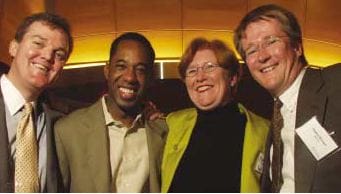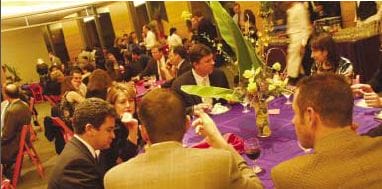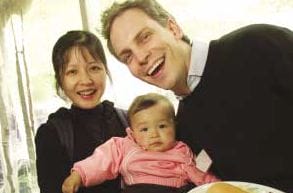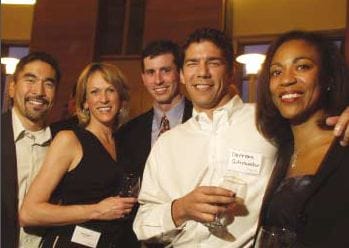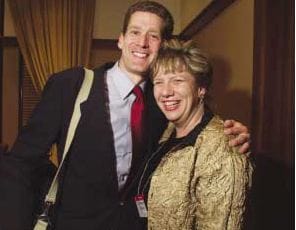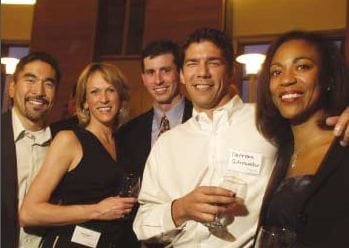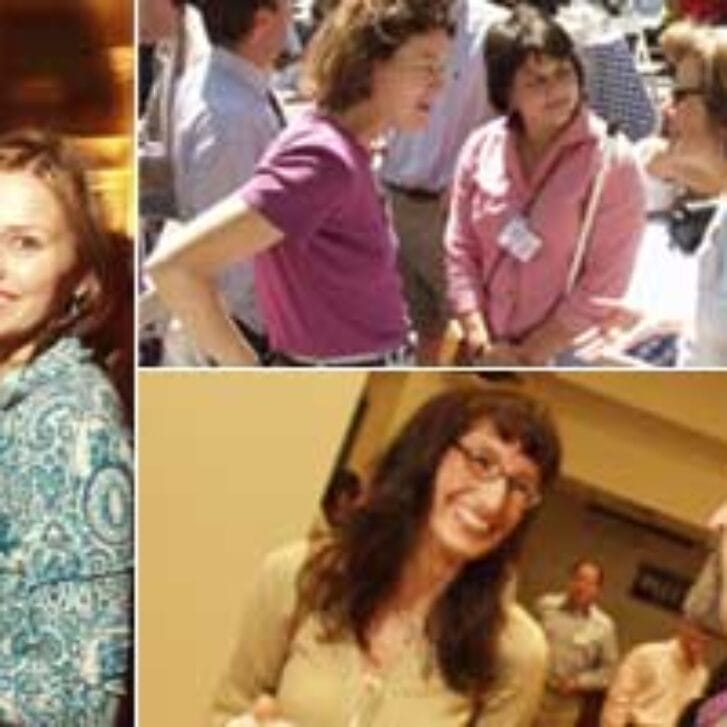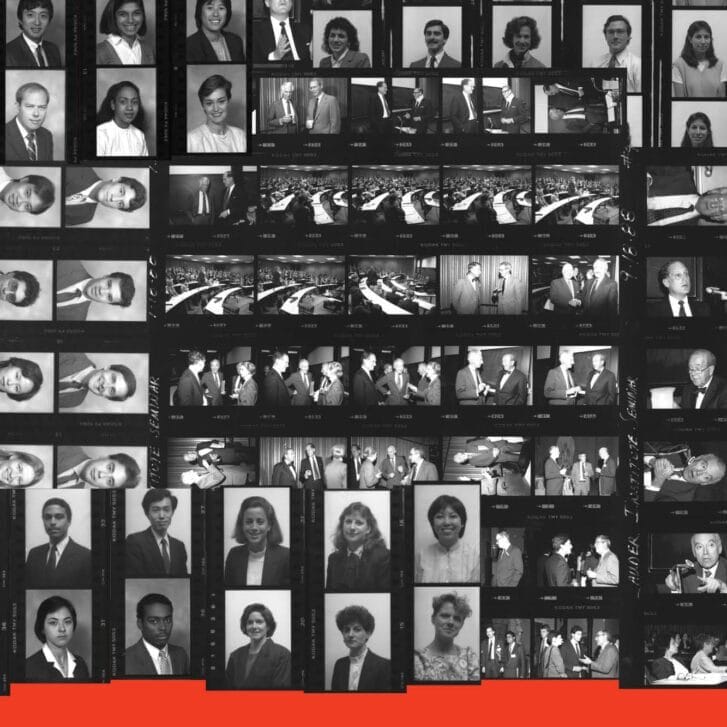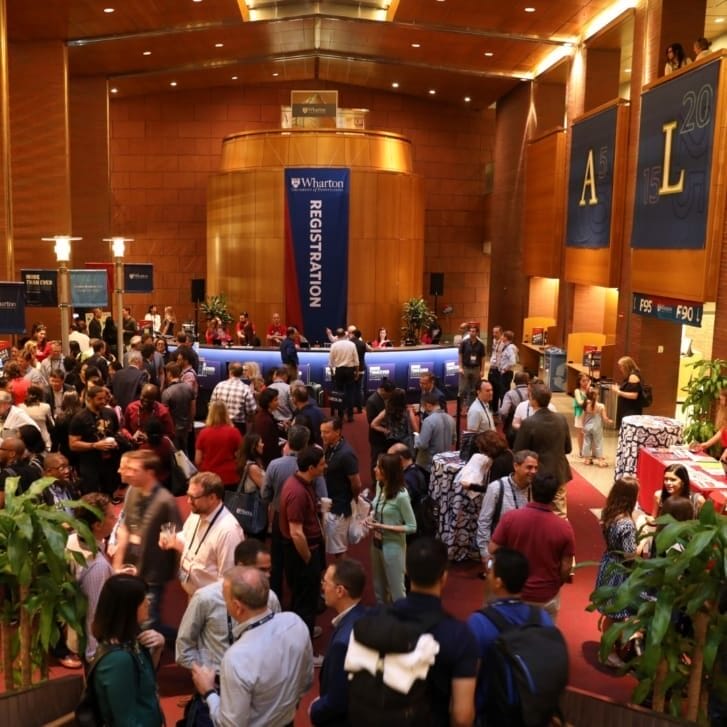More than 1000 alumni and guests attended this year’s Reunion festivities in May. Highlights of the weekend included an all-alumni reception in the Patty and Jay H. Baker Forum of Jon M. Huntsman Hall; presentations by faculty, including Professor Mike Useem; and a packed alumni/faculty exchange featuring Peter Lynch, WG’68, and Professor Jeremy Siegel. MBA reunion dinners were held at The Philadelphia Zoo (Class of ’98), the Colloquium in Jon M. Huntsman Hall (Class of ’93), and The Ballrooms at the Inn at Penn (Classes of ’88, ’83, ’78, ’73, ’68, ’63, ’58, ’53, ’48, ’43, ’38, and ’33).
Despite the unusually chilly weather and the threat of rain, alumni, guests, and children enjoyed the food, presentations, and the opportunity to catch up with one another. In the pages that follow, we offer some images of the weekend, along with profiles of individuals who took the time to speak with us about what they’ve been doing since they left Wharton.
 Diplomat to the Stars: David Richards, WG’93
Diplomat to the Stars: David Richards, WG’93
David Richards, WG’93, always had a hunch he would have a career in the theater. But acting left him flat.
“The epitome of being an actor is to do the same role on Broadway over and over,” says Richards, 36, who traveled from New York City to attend Reunion. “I’d been performing all my life; I just knew I didn’t want to do it for a living. I wanted more influence over the arts – to be where the decisions were made.”
Richards started to tackle the trade of managing productions as an intern while earning his undergraduate degree in mathematics, economics, and music from Duke University. He grew more confident about this management niche during his stay at Wharton. “As much as the temptation was there to make money,” says Richards, now a general manager for Broadway and off-Broadway productions, “I never had an interview during my time at Wharton.”
Instead, he started out answering phones for $400 a week in New York City. “Thus definitely bringing down the average starting salary of our class,” he jokes.
But in 1997, he formed Richards/Climan, Inc. (RCI), with colleague Tamar Climan, to manage the Broadway revival of “Annie” starring Nell Carter and its post-Broadway tour starring Sally Struthers. RCI also managed “More to Love” at the Eugene O’Neill Theatre; the pre-Broadway production of “Finian’s Rainbow”; the off-Broadway hit “Dinner with Friends,” which won the Pulitzer Prize in 2000; and “Me and Mrs. Jones,” starring Lou Rawls. The national tours of “Jelly’s Last Jam,” starring Maurice Hines and Savion Glover, were also under Richard’s management, as well as “Deathtrap” starring Elliot Gould and Mariette Hartley and “Ain’t Misbehavin’” starring The Pointer Sisters.
Handling so much star power calls for a delicate yet determined style. “A lot of what you are is a diplomat,” says Richards, who regularly caters to celebrities’ whims. If their contracts require a satellite dish, luxury suites, or particular Chablis, it’s his job to make sure they get it. The formula for a successful show, says Richards, is a happy cast. His behind-the- scenes role in major productions means Richards has to glide expertly between temperamental performers, edgy investors, and pushy marketing folk. That means navigating serpentine budgeting contracts, too – on Broadway there are close to 15 unions.
It’s an emotionally stressful job, admits Richards. “There is a lot of tension that can appear with 200 people working on a show. Tempers and emotions can run high.” His day starts at ten and ends when the curtain rises. “But it’s exciting to work with such diverse people, even if they do throw tantrums. What I love about the job is the problem solving. And then some days the phone doesn’t ring, and you can actually get your work done.” –Kate Campbell
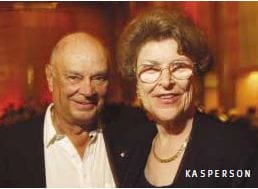 Innovation Is the Key: Lucinda Kasperson, WG’53
Innovation Is the Key: Lucinda Kasperson, WG’53
Lucinda Kasperson, WG’53, often thinks about a favorite aunt who worked until age 100. That familial drive, she says, still inspires her in her own vibrant life, career, and international charity work.
“The principles of banking I learned fifty years ago are still valid in 2003,” says Kasperson, whose wide-ranging careers included roles as a researcher, economist, educator, politician, computer consultant, and, most recently, banker in Bosnia.
“The flexibility to accept new challenges came from my Wharton training,” says Kasperson, who graduated from Mount Holy Oak with a degree in math and economics before arriving at the School. “I love installing computer systems, diagnosing problems, and teaching customers how to use them. It keeps me in touch with the current technology and is a link to the next generations. The key to life as in business is innovation of process or product.”
At Wharton, Kasperson majored in finance and dreamed of working as a bank loan officer after graduation. “But they didn’t hire women for those jobs then,” says Kasperson, who is married to Richard (Dick) Kasperson. They have two sons.
Her career began with the National Association of Bank Loan Officers as a research officer for Robert Morris Associates. Three years in the research department of the Federal Reserve Bank in Chicago followed. After her children were born, Kasperson taught as a professor of economics at Loyola University in Chicago for eight years.
“My education at Wharton had a great deal to do with nearly all of these careers,” she says. “The teaching of research skills was paramount as a basis for all of them. This enabled me to be elected to public office, to assist my children with their needs, and to obtain positions of responsibility in business and education.”
Kasperson was elected Village President (Mayor) of her Northbrook, Illinois, community, serving from 1981 to 1985. She’s been a part of the city council there for 18 years. Along with her public service stateside, Kasperson has been involved in an international project that included setting up a special residence for young women of a hill tribe in northern Thailand so that they can attend high school. She and her husband have traveled to 64 countries, 39 in the last three years.
In 1987, Kasperson formed a computer consulting firm. When one of her customers learned of her background in finance, Kasperson was asked to help start a bank in Bijeljina, Bosnia. She jumped at the chance and arrived in Bosnia in August 2001 and stayed for nearly a year. “I was president of the bank and worked full time with my own translator,” says Kasperson. The 113-year-old Semberska Bank was the first to be privatized in Bosnia. “It was a treasure and wonderful to be in another country where the people were so passionate,” she adds. –Kate Campbell
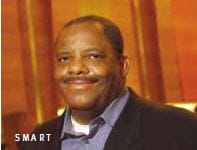 In Good Company: Michael Smart, WG’88
In Good Company: Michael Smart, WG’88
When Mike Smart returned to Wharton this year as chair of his class’s fifteen-year reunion, he had plenty to feel thankful for. He is happily married to Jodi Clement Smart and has a two-year-old daughter, Caroline. And, after many successful years in private equity, he is in the midst of creating his own firm, Williams Capital Partners.
He’s in particularly good company: “Two of my three partners are Wharton alums, Joli Cooper, WG’88, and Carl Cordova, WG’89,” he says proudly. The partners will focus on their areas of expertise – consumer products, manufacturing, and distribution – to build a new kind of private equity firm. “We will be taking a slightly different approach. Before looking at the numbers, we will be looking at the company itself and ask, how can we enhance the operations strategy?” he explains.
Williams Capital Partners is a spin-off of First Atlantic Capital, where Smart has worked for the past two years. Previously, Smart spent nearly a decade at Merrill Lynch, first in the corporate finance department, specializing in private equity and leveraged buyouts, and later as managing director.
Smart’s interest in private equity dates back to his pre-Wharton days, when he worked on a number of leveraged buyouts. His employer at the time felt that an MBA would take him even further, and Smart agreed that Wharton was the premier place to earn his degree.
“As a Wharton graduate, I think I’m capable of doing just about anything if I focus on it and commit myself,” he says. His recognition of the many benefits of his Wharton degree has led to a high level of involvement as an alumnus, culminating in chairing the reunion this year.
Smart worked with the Office of Development and Alumni Affairs to organize his class’s fundraising and marketing efforts. The result was $206,000 in pledges – including a large pledge from Smart – as well as a great weekend with former classmates. “I like to lead by example, and by setting an example for the students who are at Wharton now, we can ensure that they will do their part in the future,” he says. –Juliana Delany
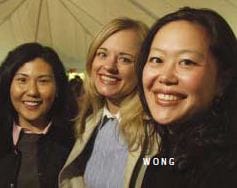 Citizen of the World: Stephanie Wong, WG’98
Citizen of the World: Stephanie Wong, WG’98
Shortly after arriving at Wharton, Stephanie Wong felt herself powerfully drawn to the field of international management. For Wong, who had lived in Hong Kong, Berlin, and throughout the U.S., it was a natural fit. She custom-designed a degree called international and financial management and has never looked back.
After graduation, Wong landed a job as a consultant at McKinsey, first in the U.S. and then in Berlin. “McKinsey was amazing in that it not only reinforced, but continually refined, the ‘tool kit’ we received at Wharton,” she remembers. In 2002, she decided to test the advice she had been giving her clients at McKinsey and co-founded a marketing consultancy and advertising firm called Fusion. As the venture moved ahead, it led to an even greater entrepreneurial opportunity, and now Wong is working with two Omnicon companies, one in the U.K. and one in Germany, to build and run a marketing strategy consultancy.
“I believe we will be one of the first major agencies, at least in Europe if not more broadly, to achieve a truly integrated strategic and creative offering,” she says with excitement. “This would be both a powerful proposition to clients and a true competitive advantage.”
Even with all of the demands of an international startup, Wong didn’t think twice about coming back to Wharton for her five-year reunion. “Although it was a somewhat long trip for a weekend, it was never a question that I would attend,” she explains. Was it worth the trip? “I’m sure this will sound corny,” she says, “But it was much more nostalgic than I ever expected, and absolutely worth every minute.” One of the best moments, she reports, was the enjoyable and informative Jeremy Siegel/Peter Lynch lecture.
When asked about her favorite memory of her Wharton years, Wong replies, “I’m lucky to be very up to date with lots of Wharton people, in particular my cohort, for whom I act as alumni cohort rep. So Wharton doesn’t seem like a memory for me – rather, it is very much ongoing.” –Juliana Delany
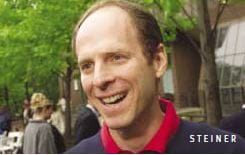 In A Good Place: Perry Steiner, WG’93
In A Good Place: Perry Steiner, WG’93
Reconnecting with old friends,” says Perry Steiner without hesitation, when asked to name the best thing about his tenth-year reunion. “People came back from all over the world. I stay in touch with a small number of close Wharton friends on a regular basis, but this was a chance to see lots of others.”
Steiner made it a point to attend the reunion despite the demands of a busy life in Washington, DC. He is married to Leslie Morgan Steiner, WG’92 (who was unable to attend her husband’s reunion because of a high school reunion she was hosting on the same weekend.) The couple, who met after they left Wharton and were both working at an ad agency, live in Georgetown with their three children, Max, 6; Morgan, 4; and Tallie, 1. Both have high-profile jobs – Perry as a fund manager at Arlington Capital Partners, and Leslie as general manager of the Washington Post Sunday magazine section. “Spare time? There isn’t much, and what we do have is kid time – tee-ball, soccer, dance, and art classes,” he says.
For the past ten years, Steiner has worked almost exclusively in private equity, except for what he describes as a “wild Internet ride” that began in 1998, when he became president of Digital River, a Minneapolis Internet company. “I was about six months ahead of the curve, and people thought I was crazy,” he remembers. “Then, everything took off, including Digital River. When the tech bubble burst, most companies came crashing down, but Digital River was, and still is, very well run. I’m still on the Board of Directors.”
Today, Steiner works as a partner in a middle market buyout fund whose clients include media, information technology, aerospace, and defense companies. “I have the best of both worlds – banking and management,” he explains. In his career as well as his family life, Steiner is in a very good place. –Juliana Delany
